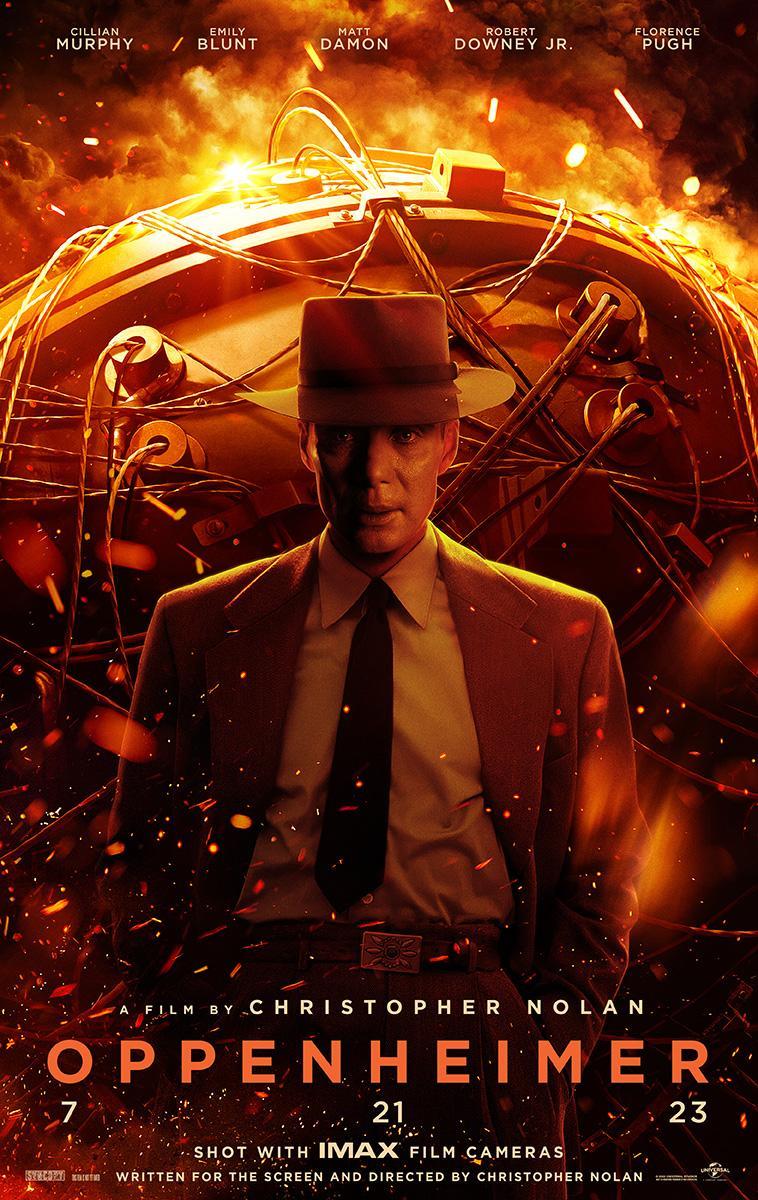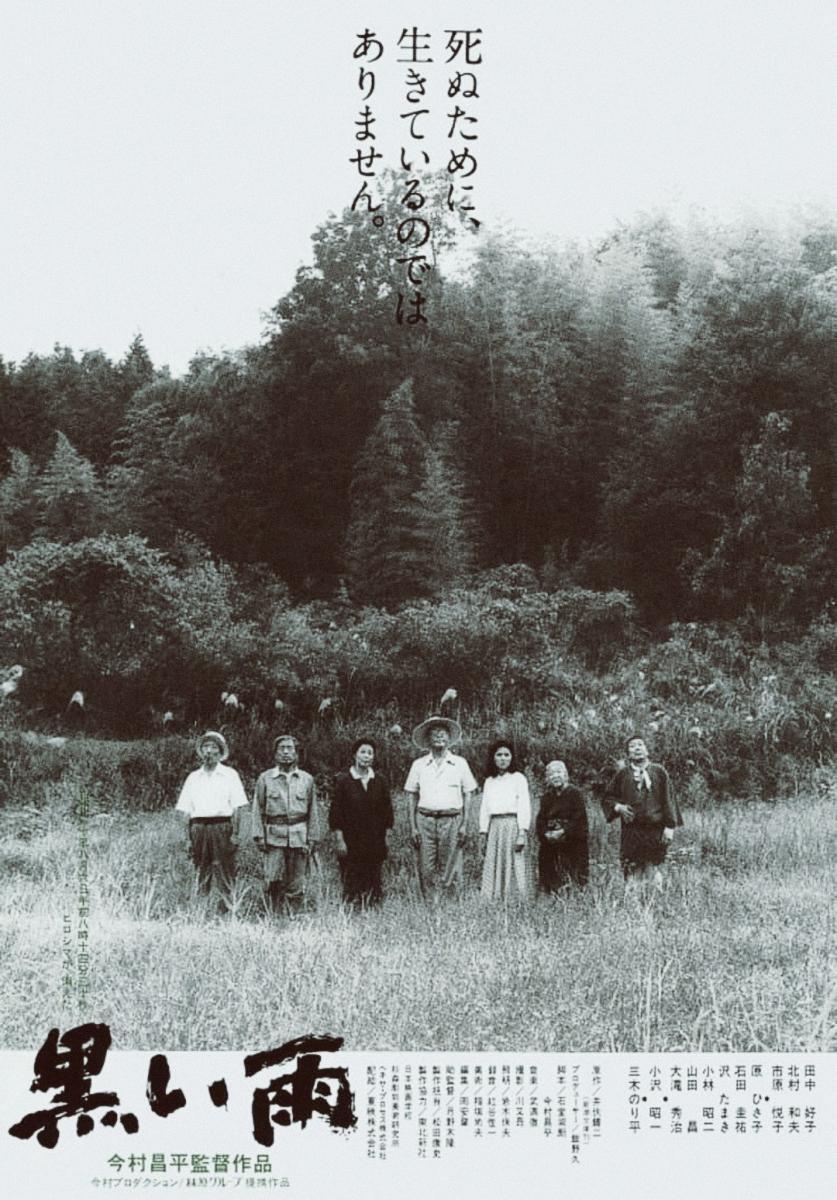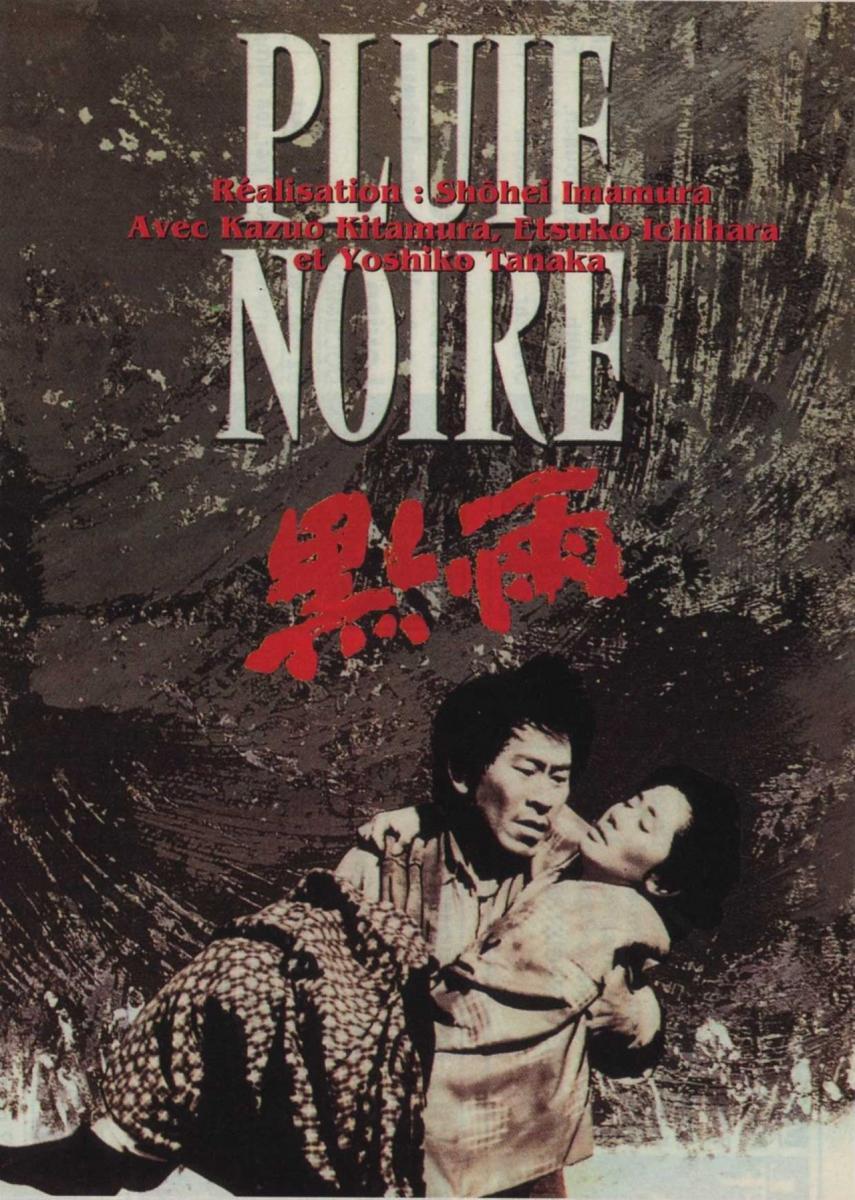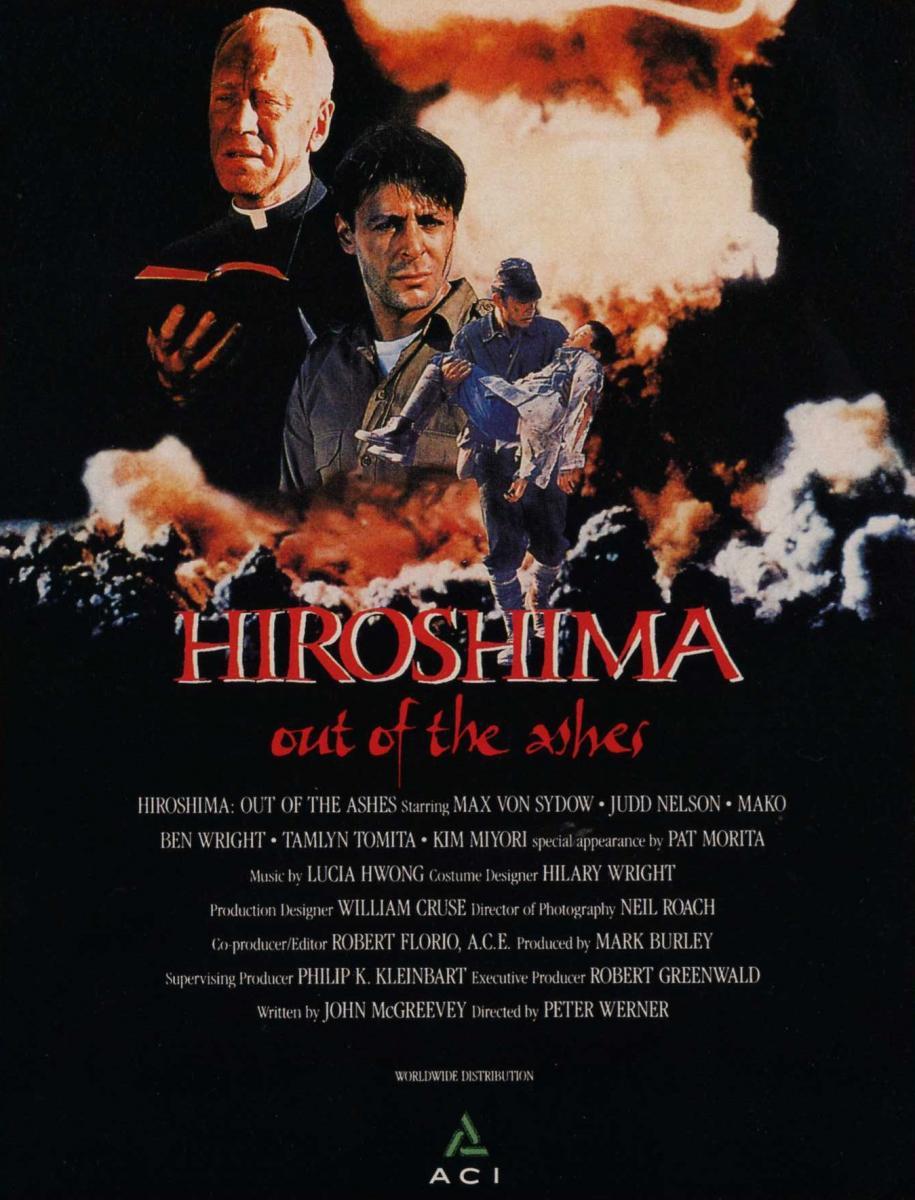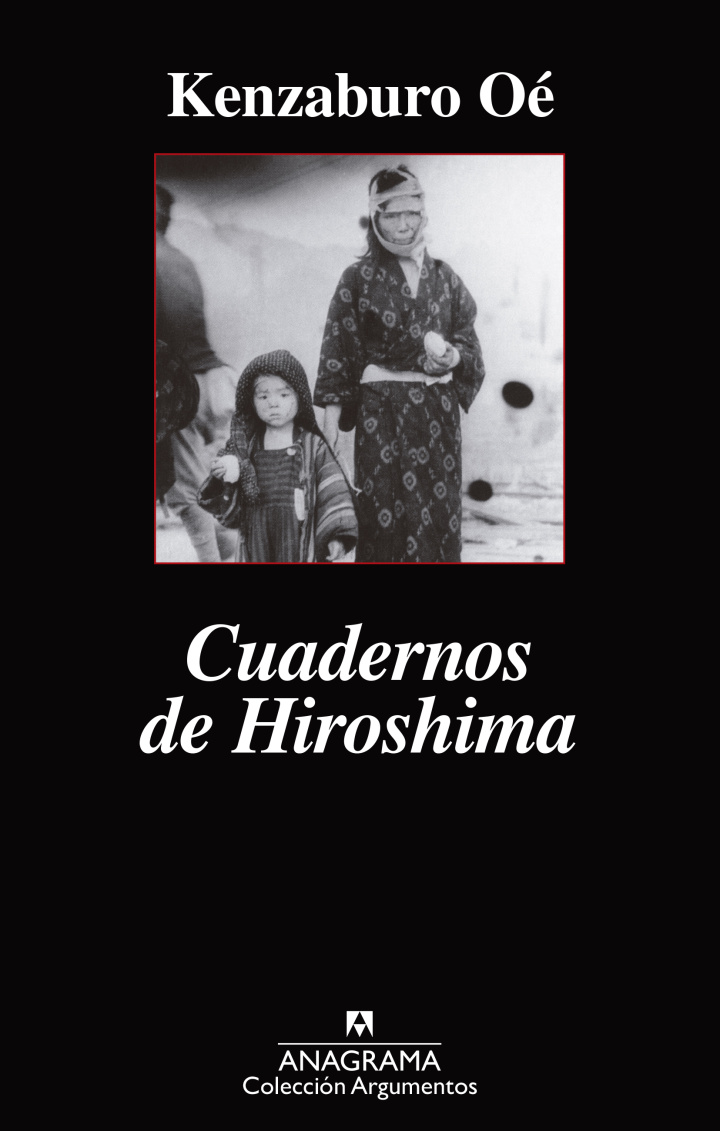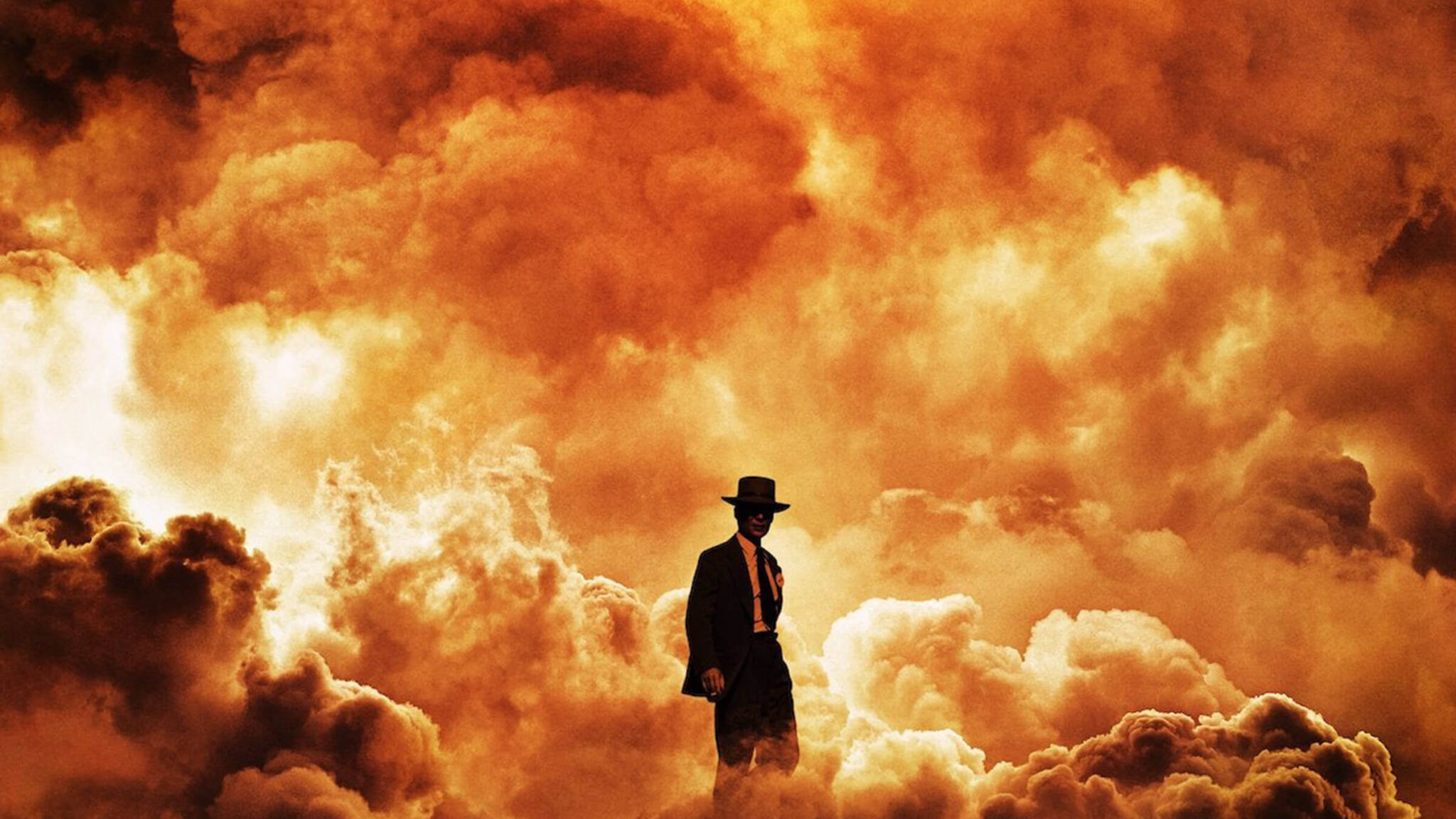
Poster de "Oppenheimer" | Poster de "Oppenheimer"
We've seen so many movies about nuclear disasters and atomic bombs that we've already normalized the term, as if these types of weapons were commonplace, or something as frequent as the wars that rage around the world every year. But, in the entire history of humanity, only two atomic bombs have been dropped in the midst of a war. Two. In ALL of history. And both were dropped by the US on Japanese soil, on August 6th and 9th, 1945, on the cities of Hiroshima and Nagasaki. This selection of films is an invitation to reflect on those dates and on what we as a species are capable of.
>Hemos visto tantas películas sobre desastres nucleares y bombas atómicas que tenemos ya _normalizado_ el término, como si este tipo de armas fueran de uso común, o algo tan frecuente como las guerras que se libran en el mundo cada año. Pero, en toda la historia de la humanidad, sólo se han lanzado dos bombas atómicas en medio de un conflicto bélico. Dos. En TODA la historia. Y ambas fueron lanzadas por los EEUU en territorio japonés, el 6 y el 9 de Agosto de 1945 sobre las ciudades de Hiroshima y Nagasaki. Esta selección de películas es una invitación a reflexionar sobre esas fechas y sobre lo que como especie somos capaces de hacer.
# _Oppenheimer (2023)_
#
To say that the brilliant American physicist Julius Robert Oppenheimer, head of the Manhattan Project, was the _creator_ of the atomic bomb would be a rather flippant statement, not without its fair share of falsehood. Uniting different theories from different theorists, a team of scientists carried out calculations and analyses to achieve—together—nuclear fission and with it unleash the greatest annihilating power that humanity had ever witnessed until then. Now, it's no less true that Oppenheimer was the key man in combining the majority of all these efforts and, as such, more responsible than others. But beyond reviewing the life of this genius—hero? villain?—or delighting in the 70mm, two-color narrative of the equally brilliant Christopher Nolan, what I want to highlight, within the framework of what brings us here today, is the human ambition to achieve the impossible, even if that challenge entails the greatest horror. That particular sequence where the top brass of the US government _have_ to decide on which target to drop the first atomic bomb is chillingly frivolous and cynical. How can such a decision be made? How can anyone say that it's _better_ to end the lives of hundreds of thousands of people in this or that place than in another? _**Oppenheimer**_ is a biographical and historical drama, but in many ways it's also a horror film, all the more terrifying for the fact that the ghosts and monsters are ourselves.
>Decir que el brillante físico estadounidense Julius Robert Oppenheimer, al frente del _Proyecto Manhattan_, fue el _creador_ de la bomba atómica, sería una declaración bastante ligera, no exenta de falsedad. Uniendo diferentes teorías de distintos teóricos, un equipo de científicos llevó a cabo cálculos y análisis para lograr - entre todos - la fisión nuclear y con ella desencadenar el mayor poder aniquilador que la humanidad hubiera presenciado hasta entonces. Ahora bien, no es menos cierto que Oppenheimer fue el hombre clave en sumar la mayoría de todos estos esfuerzos y, como tal, responsable en mayor medida que otros. Pero más allá de repasar la vida de este genio - ¿héroe? ¿villano? - o de deleitarse con la narrativa en 70 mm y en dos colores distintos del también brillante Christopher Nolan, lo que quiero resaltar, en el marco de lo que nos convoca acá hoy, es la ambición humana por lograr lo imposible, aunque ese desafío implique el mayor de los horrores. Esa secuencia en particular en donde los altos mandos del gobierno de EEUU _tienen_ que decidir sobre qué objetivo lanzar la primera bomba atómica es de una frivolidad y un cinismo escalofriantes, ¿cómo se puede tomar esa decisión? ¿cómo puede alguien decir que _es mejor_ acabar con la vida de cientos de miles de personas en tal o cual lugar que en otro? _**Oppenheimer**_ es un drama biográfico e histórico, pero de muchas maneras es también una película de terror, más aterradora por el hecho de que los fantasmas y monstruos somos nosotros mismos.
# _Kono ko wo nokoshite (1983)_
#
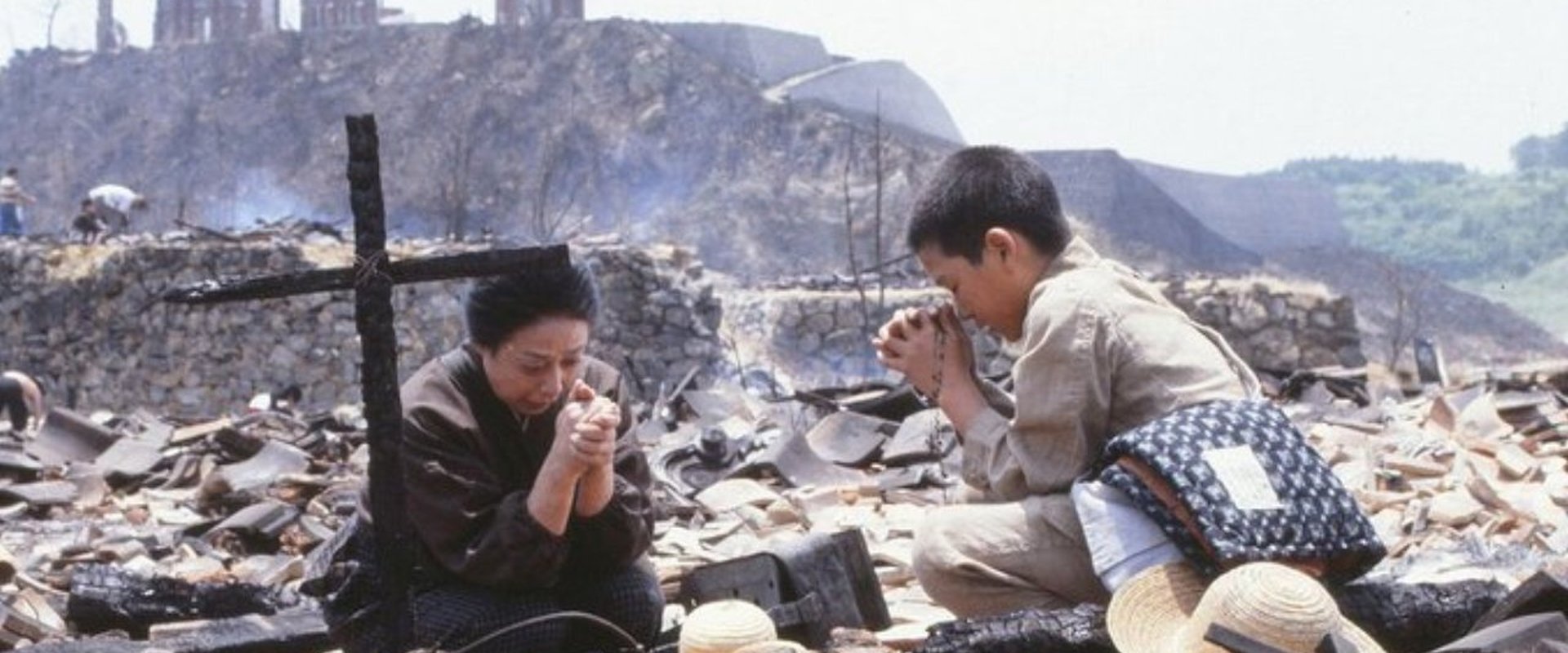 Scene from the movie | Escena de la película
Co-written and directed by Keisuke Kinoshita based on the novel by Takashi Nagai, this is one of the few films to focus on the second bomb. The rubble in Hiroshima had barely cooled when another bomb was dropped on the city of Nagasaki, and this second episode, which was even more catastrophic than the first, is often omitted in retellings. Known in English as _**Children of Nagasaki**_, the film tells the story of a family before and after the atomic bomb explosion, and gives us a glimpse into how that episode was experienced on the other side of the world, the victims side.
>Coescrita y dirigida por Keisuke Kinoshita a partir de la novela de Takashi Nagai, esta es una de las pocas películas que se centra en la segunda bomba. No habían terminado de enfriarse los escombros en Hiroshima cuando otra bomba fue arrojada sobre la ciudad de Nagasaki y muchas veces, en el recuento, se omite este segundo episodio, que fue incluso más catastrófico que el primero. Conocida en inglés como _**Children of Nagasaki**_, la cinta cuenta la vida de una familia, antes y después de la explosión de la bomba atómica, y nos sirve para ver cómo se vivió ese episodio del otro lado del mundo, del lado de las víctimas.
# _Kuroi ame (1989)_
#
After the explosion, its shock wave, and its destructive power, the skies of Japan were covered in a gigantic cloud of smoke that not only plunged the attacked cities into dense darkness, but after the condensation of that vapor and interaction with other gases present in the air, it fell back to earth, this time in the form of rain. Acid rain. Black. Toxic. _**Black Rain**_, also based on a novel, focuses on recounting the consequences of the atomic explosion for the inhabitants of Hiroshima, thousands of whom fell ill and died, _collateral_ victims of the blast. Imagine the destructive power of a bomb that not only pulverizes everything within its radius of action at the moment of impact, but also after it has fallen, months, years later, continues to sicken and kill people who survived the explosion, but who succumbed to their exposure to the subsequent radiation, to acid rain. There was no precedent, we didn't know exactly what would happen, we never imagined that the explosion could be a _kindness_ due to its devastating power because it ended everything so quickly. On the other hand, the aftermath, the consequences, would also continue to kill, but in a slower, more painful, and equally inevitable way. We didn't know, but those who launched it must have known. They must have known everything that would come next. And yet, they attacked. They unleashed that devastation on the civilian population. Twice.
>Tras la explosión, su onda expansiva y su poder destructor, el cielo de Japón se cubrió de una gigantesca nube de humo que no sólo sumió a las ciudades atacadas en una densa oscuridad sino que, tras la condensación de ese vapor y la interacción con otros gases presentes en el aire, volvió a caer sobre la tierra, esta vez en forma de lluvia. Una lluvia ácida. Negra. Tóxica. _**Black Rain**_, basada también en una novela, se concentra en relatar las consecuencias de la explosión atómica para los habitantes de Hiroshima, miles de los cuales enfermaron y murieron, víctimas _colaterales_ de la explosión. Imaginen el poder destructivo de una bomba que no sólo pulveriza todo lo que existe en su radio de acción en el momento del impacto, sino que luego de que ha caído, meses, años más tarde, sigue enfermando y acabando con la vida de personas que sobrevivieron a la explosión, pero que sucumbieron por estar expuestos a la radiación posterior, a la lluvia ácida. No había precedentes, no sabíamos con exactitud lo que pasaría, nunca imaginamos que la explosión podía ser una _gentileza_ debido a su poderío devastador porque acababa todo muy rápido. En cambio, el después, las consecuencias, irían asesinando también, pero de una forma más lenta, dolorosa e igual de inevitable. Nosotros no lo sabíamos, pero aquellos que la arrojaron sí tenían que saberlo. Tenían que haber sabido todo lo que vendría después. Y aún así, atacaron. Arrojaron esa devastación sobre la población civil. Dos veces.
# _Hiroshima: Out of the Ashes (1990)_
#
Scene from the movie | Escena de la película
Co-written and directed by Keisuke Kinoshita based on the novel by Takashi Nagai, this is one of the few films to focus on the second bomb. The rubble in Hiroshima had barely cooled when another bomb was dropped on the city of Nagasaki, and this second episode, which was even more catastrophic than the first, is often omitted in retellings. Known in English as _**Children of Nagasaki**_, the film tells the story of a family before and after the atomic bomb explosion, and gives us a glimpse into how that episode was experienced on the other side of the world, the victims side.
>Coescrita y dirigida por Keisuke Kinoshita a partir de la novela de Takashi Nagai, esta es una de las pocas películas que se centra en la segunda bomba. No habían terminado de enfriarse los escombros en Hiroshima cuando otra bomba fue arrojada sobre la ciudad de Nagasaki y muchas veces, en el recuento, se omite este segundo episodio, que fue incluso más catastrófico que el primero. Conocida en inglés como _**Children of Nagasaki**_, la cinta cuenta la vida de una familia, antes y después de la explosión de la bomba atómica, y nos sirve para ver cómo se vivió ese episodio del otro lado del mundo, del lado de las víctimas.
# _Kuroi ame (1989)_
#
After the explosion, its shock wave, and its destructive power, the skies of Japan were covered in a gigantic cloud of smoke that not only plunged the attacked cities into dense darkness, but after the condensation of that vapor and interaction with other gases present in the air, it fell back to earth, this time in the form of rain. Acid rain. Black. Toxic. _**Black Rain**_, also based on a novel, focuses on recounting the consequences of the atomic explosion for the inhabitants of Hiroshima, thousands of whom fell ill and died, _collateral_ victims of the blast. Imagine the destructive power of a bomb that not only pulverizes everything within its radius of action at the moment of impact, but also after it has fallen, months, years later, continues to sicken and kill people who survived the explosion, but who succumbed to their exposure to the subsequent radiation, to acid rain. There was no precedent, we didn't know exactly what would happen, we never imagined that the explosion could be a _kindness_ due to its devastating power because it ended everything so quickly. On the other hand, the aftermath, the consequences, would also continue to kill, but in a slower, more painful, and equally inevitable way. We didn't know, but those who launched it must have known. They must have known everything that would come next. And yet, they attacked. They unleashed that devastation on the civilian population. Twice.
>Tras la explosión, su onda expansiva y su poder destructor, el cielo de Japón se cubrió de una gigantesca nube de humo que no sólo sumió a las ciudades atacadas en una densa oscuridad sino que, tras la condensación de ese vapor y la interacción con otros gases presentes en el aire, volvió a caer sobre la tierra, esta vez en forma de lluvia. Una lluvia ácida. Negra. Tóxica. _**Black Rain**_, basada también en una novela, se concentra en relatar las consecuencias de la explosión atómica para los habitantes de Hiroshima, miles de los cuales enfermaron y murieron, víctimas _colaterales_ de la explosión. Imaginen el poder destructivo de una bomba que no sólo pulveriza todo lo que existe en su radio de acción en el momento del impacto, sino que luego de que ha caído, meses, años más tarde, sigue enfermando y acabando con la vida de personas que sobrevivieron a la explosión, pero que sucumbieron por estar expuestos a la radiación posterior, a la lluvia ácida. No había precedentes, no sabíamos con exactitud lo que pasaría, nunca imaginamos que la explosión podía ser una _gentileza_ debido a su poderío devastador porque acababa todo muy rápido. En cambio, el después, las consecuencias, irían asesinando también, pero de una forma más lenta, dolorosa e igual de inevitable. Nosotros no lo sabíamos, pero aquellos que la arrojaron sí tenían que saberlo. Tenían que haber sabido todo lo que vendría después. Y aún así, atacaron. Arrojaron esa devastación sobre la población civil. Dos veces.
# _Hiroshima: Out of the Ashes (1990)_
#
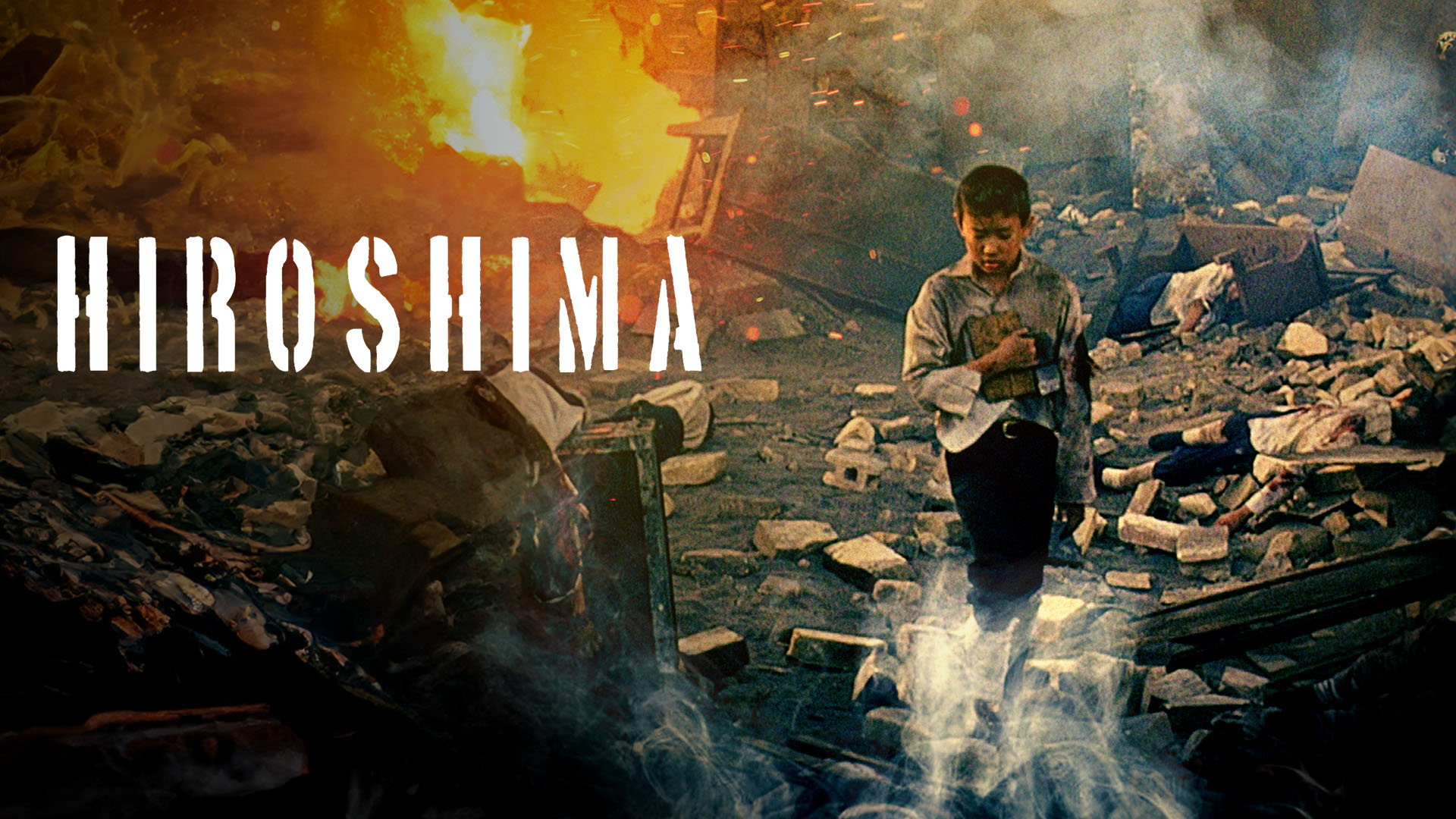 Movie Poster | Poster de la película
This was a television film that also sought to portray the consequences of the atomic bombing, but from the perspective of several characters, from the Japanese victims to American soldiers. There's no comparison between the consequences suffered by both sides, and while I understand how deeply such an event can psychologically affect the _victors_, I believe the victims have a million times harder time rebuilding their lives in the midst of a catastrophe that destroyed their homes, their families, their country, their past, and, in many ways, their future as well.
>Esta fue una película producida para televisión que también buscó retratar las consecuencias del bombardeo atómico, pero tomando la perspectiva de varios personajes, desde las víctimas japonesas a soldados americanos. No hay punto de comparación en cuanto a las consecuencias sufridas de un lado y de otro, y aunque entiendo lo mucho que puede afectar un hecho así, psicológicamente, a los _vencedores_, creo que las víctimas lo tienen millones de veces más difícil para reconstruir su vida en medio de una catástrofe que acabó con sus casas, su familia, su país, su pasado y, de muchas formas, también su futuro.
I haven't seen the latter, but what strikes me most is seeing the great Max von Sydow, Ingmar Bergman's favorite actor, alongside Pat Morita, the immortal Mr. Miyagi from *The Karate Kid*, in the same film. What a duo, huh? In addition to the aforementioned titles, you can also add the live-action version of *The Grave of the Fireflies* (although the Ghibli animated version is better), the tangentially related *Hiroshima, mon amour* directed by Alain Resnais and written by Marguerite Duras, or documentaries like the extremely raw *White Light/Black Rain: The Destruction of Hiroshima and Nagasaki* or *Hiroshima: The Aftermath*. If you'd like to review more sources, I can recommend the book _MANIAC_ by Benjamín Labatut, which is more concerned with the science behind the bomb's construction than the explosion itself; and _Hiroshima Notes_ by Nobel Prize winner in Literature Kenzaburo Oé, in which the author collects testimonies from the site two decades after the war. It's said that history is told by the victors, but no story is complete without the words of all those involved. In this and other events, it's essential to review what's being said on both sides, put the pieces together, and try to understand what often has no explanation. Are there any other films related to Hiroshima or Nagasaki that you've seen and would recommend? I'll read you in the comments.
>Esta última no la he visto, pero lo que más me llama la atención es poder ver en una misma película al gran Max von Sydow, actor de cabecera de Ingmar Bergman, junto a Pat Morita, el inmortal Sr. Miyagi de _The Karate Kid_. Vaya dupla, ¿cierto? Además de los títulos mencionados, también pueden agregar la versión live action de _The Grave of the Fireflies_ (aunque la versión animada de Ghibli es mejor), la tangencialmente relacionada con el tema _Hiroshima, mon amour_ con dirección de Alain Resnais y guion de Marguerite Duras, o documentales como el crudísimo _White Light/Black Rain: The Destruction of Hiroshima and Nagasaki_ o _Hiroshima: The Aftermath_. Si quieren revisar más fuentes, les puedo recomendar el libro _MANIAC_ de Benjamín Labatut, más relacionado con la ciencia detrás de la construcción de la bomba que con la explosión en sí; y _Cuadernos de Hiroshima_ del ganador del Premio Nobel de Literatura Kenzaburo Oé, en donde el autor recoge testimonios en el lugar dos décadas después de la guerra. Se dice que la historia la cuentan los vencedores, pero ninguna historia está completa sin la palabra de todos los que intervinieron. En este y otros eventos, es indispensable repasar lo que se dice de un lado y del otro, unir las piezas y tratar de entender lo que muchas veces no tiene una explicación, ¿hay alguna otra película relacionada con Hiroshima o Nagasaki que hayan visto y que quieran recomendar? Los leo en los comentarios.
---
Movie Poster | Poster de la película
This was a television film that also sought to portray the consequences of the atomic bombing, but from the perspective of several characters, from the Japanese victims to American soldiers. There's no comparison between the consequences suffered by both sides, and while I understand how deeply such an event can psychologically affect the _victors_, I believe the victims have a million times harder time rebuilding their lives in the midst of a catastrophe that destroyed their homes, their families, their country, their past, and, in many ways, their future as well.
>Esta fue una película producida para televisión que también buscó retratar las consecuencias del bombardeo atómico, pero tomando la perspectiva de varios personajes, desde las víctimas japonesas a soldados americanos. No hay punto de comparación en cuanto a las consecuencias sufridas de un lado y de otro, y aunque entiendo lo mucho que puede afectar un hecho así, psicológicamente, a los _vencedores_, creo que las víctimas lo tienen millones de veces más difícil para reconstruir su vida en medio de una catástrofe que acabó con sus casas, su familia, su país, su pasado y, de muchas formas, también su futuro.
I haven't seen the latter, but what strikes me most is seeing the great Max von Sydow, Ingmar Bergman's favorite actor, alongside Pat Morita, the immortal Mr. Miyagi from *The Karate Kid*, in the same film. What a duo, huh? In addition to the aforementioned titles, you can also add the live-action version of *The Grave of the Fireflies* (although the Ghibli animated version is better), the tangentially related *Hiroshima, mon amour* directed by Alain Resnais and written by Marguerite Duras, or documentaries like the extremely raw *White Light/Black Rain: The Destruction of Hiroshima and Nagasaki* or *Hiroshima: The Aftermath*. If you'd like to review more sources, I can recommend the book _MANIAC_ by Benjamín Labatut, which is more concerned with the science behind the bomb's construction than the explosion itself; and _Hiroshima Notes_ by Nobel Prize winner in Literature Kenzaburo Oé, in which the author collects testimonies from the site two decades after the war. It's said that history is told by the victors, but no story is complete without the words of all those involved. In this and other events, it's essential to review what's being said on both sides, put the pieces together, and try to understand what often has no explanation. Are there any other films related to Hiroshima or Nagasaki that you've seen and would recommend? I'll read you in the comments.
>Esta última no la he visto, pero lo que más me llama la atención es poder ver en una misma película al gran Max von Sydow, actor de cabecera de Ingmar Bergman, junto a Pat Morita, el inmortal Sr. Miyagi de _The Karate Kid_. Vaya dupla, ¿cierto? Además de los títulos mencionados, también pueden agregar la versión live action de _The Grave of the Fireflies_ (aunque la versión animada de Ghibli es mejor), la tangencialmente relacionada con el tema _Hiroshima, mon amour_ con dirección de Alain Resnais y guion de Marguerite Duras, o documentales como el crudísimo _White Light/Black Rain: The Destruction of Hiroshima and Nagasaki_ o _Hiroshima: The Aftermath_. Si quieren revisar más fuentes, les puedo recomendar el libro _MANIAC_ de Benjamín Labatut, más relacionado con la ciencia detrás de la construcción de la bomba que con la explosión en sí; y _Cuadernos de Hiroshima_ del ganador del Premio Nobel de Literatura Kenzaburo Oé, en donde el autor recoge testimonios en el lugar dos décadas después de la guerra. Se dice que la historia la cuentan los vencedores, pero ninguna historia está completa sin la palabra de todos los que intervinieron. En este y otros eventos, es indispensable repasar lo que se dice de un lado y del otro, unir las piezas y tratar de entender lo que muchas veces no tiene una explicación, ¿hay alguna otra película relacionada con Hiroshima o Nagasaki que hayan visto y que quieran recomendar? Los leo en los comentarios.
---
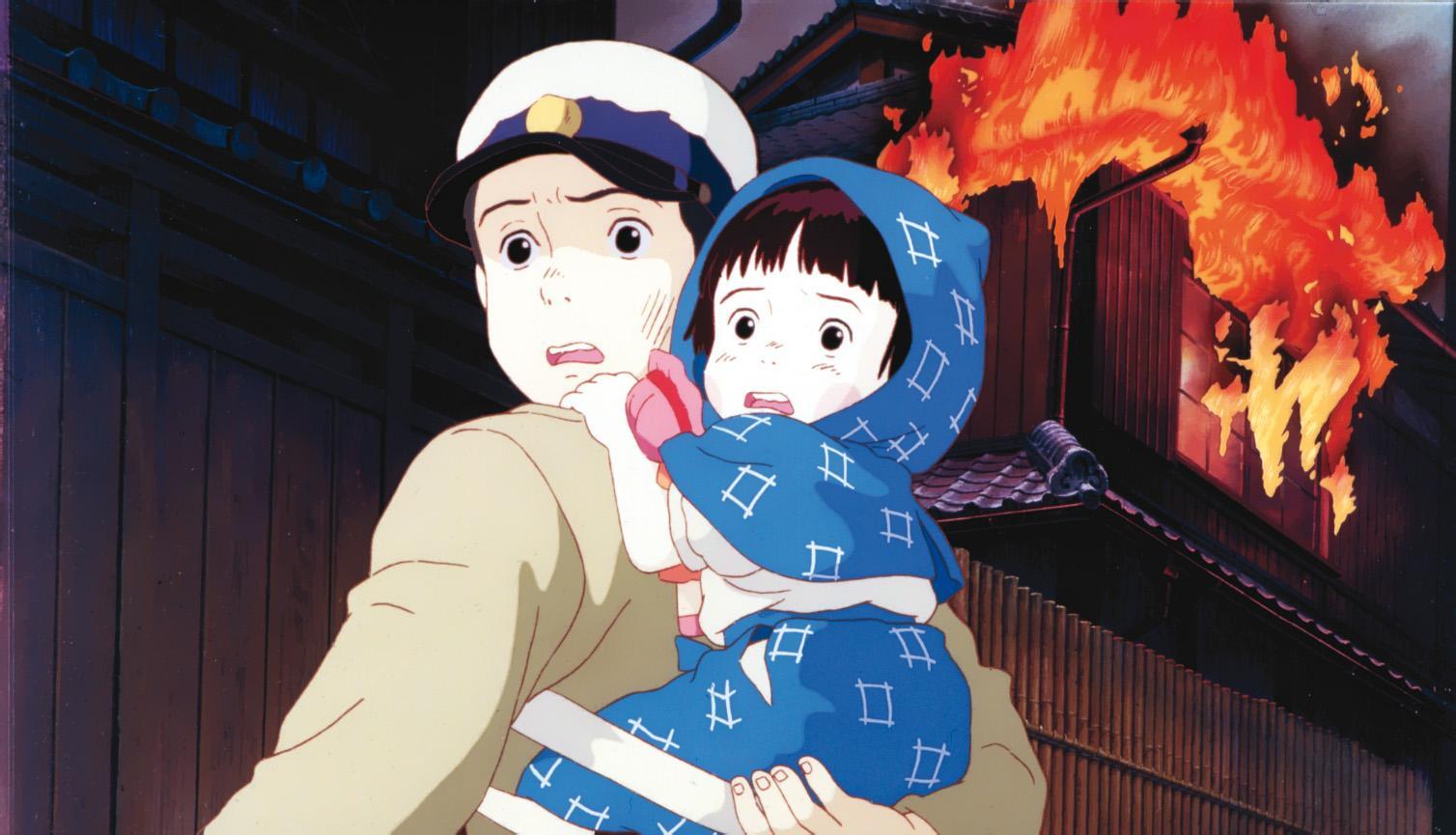 --- | ---
--- | ---
 Scene from the movie | Escena de la película
Co-written and directed by Keisuke Kinoshita based on the novel by Takashi Nagai, this is one of the few films to focus on the second bomb. The rubble in Hiroshima had barely cooled when another bomb was dropped on the city of Nagasaki, and this second episode, which was even more catastrophic than the first, is often omitted in retellings. Known in English as _**Children of Nagasaki**_, the film tells the story of a family before and after the atomic bomb explosion, and gives us a glimpse into how that episode was experienced on the other side of the world, the victims side.
>Coescrita y dirigida por Keisuke Kinoshita a partir de la novela de Takashi Nagai, esta es una de las pocas películas que se centra en la segunda bomba. No habían terminado de enfriarse los escombros en Hiroshima cuando otra bomba fue arrojada sobre la ciudad de Nagasaki y muchas veces, en el recuento, se omite este segundo episodio, que fue incluso más catastrófico que el primero. Conocida en inglés como _**Children of Nagasaki**_, la cinta cuenta la vida de una familia, antes y después de la explosión de la bomba atómica, y nos sirve para ver cómo se vivió ese episodio del otro lado del mundo, del lado de las víctimas.
# _Kuroi ame (1989)_
#
After the explosion, its shock wave, and its destructive power, the skies of Japan were covered in a gigantic cloud of smoke that not only plunged the attacked cities into dense darkness, but after the condensation of that vapor and interaction with other gases present in the air, it fell back to earth, this time in the form of rain. Acid rain. Black. Toxic. _**Black Rain**_, also based on a novel, focuses on recounting the consequences of the atomic explosion for the inhabitants of Hiroshima, thousands of whom fell ill and died, _collateral_ victims of the blast. Imagine the destructive power of a bomb that not only pulverizes everything within its radius of action at the moment of impact, but also after it has fallen, months, years later, continues to sicken and kill people who survived the explosion, but who succumbed to their exposure to the subsequent radiation, to acid rain. There was no precedent, we didn't know exactly what would happen, we never imagined that the explosion could be a _kindness_ due to its devastating power because it ended everything so quickly. On the other hand, the aftermath, the consequences, would also continue to kill, but in a slower, more painful, and equally inevitable way. We didn't know, but those who launched it must have known. They must have known everything that would come next. And yet, they attacked. They unleashed that devastation on the civilian population. Twice.
>Tras la explosión, su onda expansiva y su poder destructor, el cielo de Japón se cubrió de una gigantesca nube de humo que no sólo sumió a las ciudades atacadas en una densa oscuridad sino que, tras la condensación de ese vapor y la interacción con otros gases presentes en el aire, volvió a caer sobre la tierra, esta vez en forma de lluvia. Una lluvia ácida. Negra. Tóxica. _**Black Rain**_, basada también en una novela, se concentra en relatar las consecuencias de la explosión atómica para los habitantes de Hiroshima, miles de los cuales enfermaron y murieron, víctimas _colaterales_ de la explosión. Imaginen el poder destructivo de una bomba que no sólo pulveriza todo lo que existe en su radio de acción en el momento del impacto, sino que luego de que ha caído, meses, años más tarde, sigue enfermando y acabando con la vida de personas que sobrevivieron a la explosión, pero que sucumbieron por estar expuestos a la radiación posterior, a la lluvia ácida. No había precedentes, no sabíamos con exactitud lo que pasaría, nunca imaginamos que la explosión podía ser una _gentileza_ debido a su poderío devastador porque acababa todo muy rápido. En cambio, el después, las consecuencias, irían asesinando también, pero de una forma más lenta, dolorosa e igual de inevitable. Nosotros no lo sabíamos, pero aquellos que la arrojaron sí tenían que saberlo. Tenían que haber sabido todo lo que vendría después. Y aún así, atacaron. Arrojaron esa devastación sobre la población civil. Dos veces.
# _Hiroshima: Out of the Ashes (1990)_
#
Scene from the movie | Escena de la película
Co-written and directed by Keisuke Kinoshita based on the novel by Takashi Nagai, this is one of the few films to focus on the second bomb. The rubble in Hiroshima had barely cooled when another bomb was dropped on the city of Nagasaki, and this second episode, which was even more catastrophic than the first, is often omitted in retellings. Known in English as _**Children of Nagasaki**_, the film tells the story of a family before and after the atomic bomb explosion, and gives us a glimpse into how that episode was experienced on the other side of the world, the victims side.
>Coescrita y dirigida por Keisuke Kinoshita a partir de la novela de Takashi Nagai, esta es una de las pocas películas que se centra en la segunda bomba. No habían terminado de enfriarse los escombros en Hiroshima cuando otra bomba fue arrojada sobre la ciudad de Nagasaki y muchas veces, en el recuento, se omite este segundo episodio, que fue incluso más catastrófico que el primero. Conocida en inglés como _**Children of Nagasaki**_, la cinta cuenta la vida de una familia, antes y después de la explosión de la bomba atómica, y nos sirve para ver cómo se vivió ese episodio del otro lado del mundo, del lado de las víctimas.
# _Kuroi ame (1989)_
#
After the explosion, its shock wave, and its destructive power, the skies of Japan were covered in a gigantic cloud of smoke that not only plunged the attacked cities into dense darkness, but after the condensation of that vapor and interaction with other gases present in the air, it fell back to earth, this time in the form of rain. Acid rain. Black. Toxic. _**Black Rain**_, also based on a novel, focuses on recounting the consequences of the atomic explosion for the inhabitants of Hiroshima, thousands of whom fell ill and died, _collateral_ victims of the blast. Imagine the destructive power of a bomb that not only pulverizes everything within its radius of action at the moment of impact, but also after it has fallen, months, years later, continues to sicken and kill people who survived the explosion, but who succumbed to their exposure to the subsequent radiation, to acid rain. There was no precedent, we didn't know exactly what would happen, we never imagined that the explosion could be a _kindness_ due to its devastating power because it ended everything so quickly. On the other hand, the aftermath, the consequences, would also continue to kill, but in a slower, more painful, and equally inevitable way. We didn't know, but those who launched it must have known. They must have known everything that would come next. And yet, they attacked. They unleashed that devastation on the civilian population. Twice.
>Tras la explosión, su onda expansiva y su poder destructor, el cielo de Japón se cubrió de una gigantesca nube de humo que no sólo sumió a las ciudades atacadas en una densa oscuridad sino que, tras la condensación de ese vapor y la interacción con otros gases presentes en el aire, volvió a caer sobre la tierra, esta vez en forma de lluvia. Una lluvia ácida. Negra. Tóxica. _**Black Rain**_, basada también en una novela, se concentra en relatar las consecuencias de la explosión atómica para los habitantes de Hiroshima, miles de los cuales enfermaron y murieron, víctimas _colaterales_ de la explosión. Imaginen el poder destructivo de una bomba que no sólo pulveriza todo lo que existe en su radio de acción en el momento del impacto, sino que luego de que ha caído, meses, años más tarde, sigue enfermando y acabando con la vida de personas que sobrevivieron a la explosión, pero que sucumbieron por estar expuestos a la radiación posterior, a la lluvia ácida. No había precedentes, no sabíamos con exactitud lo que pasaría, nunca imaginamos que la explosión podía ser una _gentileza_ debido a su poderío devastador porque acababa todo muy rápido. En cambio, el después, las consecuencias, irían asesinando también, pero de una forma más lenta, dolorosa e igual de inevitable. Nosotros no lo sabíamos, pero aquellos que la arrojaron sí tenían que saberlo. Tenían que haber sabido todo lo que vendría después. Y aún así, atacaron. Arrojaron esa devastación sobre la población civil. Dos veces.
# _Hiroshima: Out of the Ashes (1990)_
#
 Movie Poster | Poster de la película
This was a television film that also sought to portray the consequences of the atomic bombing, but from the perspective of several characters, from the Japanese victims to American soldiers. There's no comparison between the consequences suffered by both sides, and while I understand how deeply such an event can psychologically affect the _victors_, I believe the victims have a million times harder time rebuilding their lives in the midst of a catastrophe that destroyed their homes, their families, their country, their past, and, in many ways, their future as well.
>Esta fue una película producida para televisión que también buscó retratar las consecuencias del bombardeo atómico, pero tomando la perspectiva de varios personajes, desde las víctimas japonesas a soldados americanos. No hay punto de comparación en cuanto a las consecuencias sufridas de un lado y de otro, y aunque entiendo lo mucho que puede afectar un hecho así, psicológicamente, a los _vencedores_, creo que las víctimas lo tienen millones de veces más difícil para reconstruir su vida en medio de una catástrofe que acabó con sus casas, su familia, su país, su pasado y, de muchas formas, también su futuro.
I haven't seen the latter, but what strikes me most is seeing the great Max von Sydow, Ingmar Bergman's favorite actor, alongside Pat Morita, the immortal Mr. Miyagi from *The Karate Kid*, in the same film. What a duo, huh? In addition to the aforementioned titles, you can also add the live-action version of *The Grave of the Fireflies* (although the Ghibli animated version is better), the tangentially related *Hiroshima, mon amour* directed by Alain Resnais and written by Marguerite Duras, or documentaries like the extremely raw *White Light/Black Rain: The Destruction of Hiroshima and Nagasaki* or *Hiroshima: The Aftermath*. If you'd like to review more sources, I can recommend the book _MANIAC_ by Benjamín Labatut, which is more concerned with the science behind the bomb's construction than the explosion itself; and _Hiroshima Notes_ by Nobel Prize winner in Literature Kenzaburo Oé, in which the author collects testimonies from the site two decades after the war. It's said that history is told by the victors, but no story is complete without the words of all those involved. In this and other events, it's essential to review what's being said on both sides, put the pieces together, and try to understand what often has no explanation. Are there any other films related to Hiroshima or Nagasaki that you've seen and would recommend? I'll read you in the comments.
>Esta última no la he visto, pero lo que más me llama la atención es poder ver en una misma película al gran Max von Sydow, actor de cabecera de Ingmar Bergman, junto a Pat Morita, el inmortal Sr. Miyagi de _The Karate Kid_. Vaya dupla, ¿cierto? Además de los títulos mencionados, también pueden agregar la versión live action de _The Grave of the Fireflies_ (aunque la versión animada de Ghibli es mejor), la tangencialmente relacionada con el tema _Hiroshima, mon amour_ con dirección de Alain Resnais y guion de Marguerite Duras, o documentales como el crudísimo _White Light/Black Rain: The Destruction of Hiroshima and Nagasaki_ o _Hiroshima: The Aftermath_. Si quieren revisar más fuentes, les puedo recomendar el libro _MANIAC_ de Benjamín Labatut, más relacionado con la ciencia detrás de la construcción de la bomba que con la explosión en sí; y _Cuadernos de Hiroshima_ del ganador del Premio Nobel de Literatura Kenzaburo Oé, en donde el autor recoge testimonios en el lugar dos décadas después de la guerra. Se dice que la historia la cuentan los vencedores, pero ninguna historia está completa sin la palabra de todos los que intervinieron. En este y otros eventos, es indispensable repasar lo que se dice de un lado y del otro, unir las piezas y tratar de entender lo que muchas veces no tiene una explicación, ¿hay alguna otra película relacionada con Hiroshima o Nagasaki que hayan visto y que quieran recomendar? Los leo en los comentarios.
---
Movie Poster | Poster de la película
This was a television film that also sought to portray the consequences of the atomic bombing, but from the perspective of several characters, from the Japanese victims to American soldiers. There's no comparison between the consequences suffered by both sides, and while I understand how deeply such an event can psychologically affect the _victors_, I believe the victims have a million times harder time rebuilding their lives in the midst of a catastrophe that destroyed their homes, their families, their country, their past, and, in many ways, their future as well.
>Esta fue una película producida para televisión que también buscó retratar las consecuencias del bombardeo atómico, pero tomando la perspectiva de varios personajes, desde las víctimas japonesas a soldados americanos. No hay punto de comparación en cuanto a las consecuencias sufridas de un lado y de otro, y aunque entiendo lo mucho que puede afectar un hecho así, psicológicamente, a los _vencedores_, creo que las víctimas lo tienen millones de veces más difícil para reconstruir su vida en medio de una catástrofe que acabó con sus casas, su familia, su país, su pasado y, de muchas formas, también su futuro.
I haven't seen the latter, but what strikes me most is seeing the great Max von Sydow, Ingmar Bergman's favorite actor, alongside Pat Morita, the immortal Mr. Miyagi from *The Karate Kid*, in the same film. What a duo, huh? In addition to the aforementioned titles, you can also add the live-action version of *The Grave of the Fireflies* (although the Ghibli animated version is better), the tangentially related *Hiroshima, mon amour* directed by Alain Resnais and written by Marguerite Duras, or documentaries like the extremely raw *White Light/Black Rain: The Destruction of Hiroshima and Nagasaki* or *Hiroshima: The Aftermath*. If you'd like to review more sources, I can recommend the book _MANIAC_ by Benjamín Labatut, which is more concerned with the science behind the bomb's construction than the explosion itself; and _Hiroshima Notes_ by Nobel Prize winner in Literature Kenzaburo Oé, in which the author collects testimonies from the site two decades after the war. It's said that history is told by the victors, but no story is complete without the words of all those involved. In this and other events, it's essential to review what's being said on both sides, put the pieces together, and try to understand what often has no explanation. Are there any other films related to Hiroshima or Nagasaki that you've seen and would recommend? I'll read you in the comments.
>Esta última no la he visto, pero lo que más me llama la atención es poder ver en una misma película al gran Max von Sydow, actor de cabecera de Ingmar Bergman, junto a Pat Morita, el inmortal Sr. Miyagi de _The Karate Kid_. Vaya dupla, ¿cierto? Además de los títulos mencionados, también pueden agregar la versión live action de _The Grave of the Fireflies_ (aunque la versión animada de Ghibli es mejor), la tangencialmente relacionada con el tema _Hiroshima, mon amour_ con dirección de Alain Resnais y guion de Marguerite Duras, o documentales como el crudísimo _White Light/Black Rain: The Destruction of Hiroshima and Nagasaki_ o _Hiroshima: The Aftermath_. Si quieren revisar más fuentes, les puedo recomendar el libro _MANIAC_ de Benjamín Labatut, más relacionado con la ciencia detrás de la construcción de la bomba que con la explosión en sí; y _Cuadernos de Hiroshima_ del ganador del Premio Nobel de Literatura Kenzaburo Oé, en donde el autor recoge testimonios en el lugar dos décadas después de la guerra. Se dice que la historia la cuentan los vencedores, pero ninguna historia está completa sin la palabra de todos los que intervinieron. En este y otros eventos, es indispensable repasar lo que se dice de un lado y del otro, unir las piezas y tratar de entender lo que muchas veces no tiene una explicación, ¿hay alguna otra película relacionada con Hiroshima o Nagasaki que hayan visto y que quieran recomendar? Los leo en los comentarios.
---
###
---
#### Other posts that may interest you | Otros posts que pueden interesarte:
#
[Animated stories about the atomic bomb](https://hive.blog/hive-166847/@cristiancaicedo/remembering-hiroshima-animated-stories-about-the-atomic-bomb-or-historias-animadas-sobre-la-bomba-atomica-eng-or-esp) |
Reviewed by | Reseñado por @cristiancaicedo
 --- | ---
--- | ---
